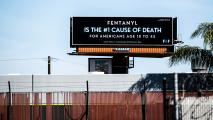Updated, 11/18/20, 2:17 EDT: On November 18, Pfizer shared another update on the Phase 3 trial, reporting that the vaccine appears to be 95% effective and more than 94% effective in adults over the age of 65.
The initial data on Pfizer’s COVID-19 vaccine is in — and the news is even better than hoped.
On November 9, the pharma giant announced that the vaccine appears to be 90% effective at preventing coronavirus infections. That far exceeds the 50% effectiveness Anthony Fauci, director of the National Institute of Allergy and Infectious Diseases, said in August would be acceptable for a coronavirus vaccine.
Still, the Pfizer COVID-19 vaccine is not quite the fatal blow to the pandemic. Here’s what it means for you and the battle to beat COVID-19.
The Trial Details
So far, Pfizer has enrolled nearly 44,000 people in its Phase 3 trial; some got a placebo and others got two doses of the vaccine.
At this point, 94 trial participants were confirmed to have contracted COVID-19 after developing symptoms.
Based on the number of infections in the vaccine and placebo groups, independent monitors calculated the Pfizer COVID-19 vaccine is more than 90% effective at preventing coronavirus infections.
That is far higher than the FDA’s requirement of at least reducing disease severity in 50% of cases.
The Caveats
So far, all the information we have about the efficacy of the Pfizer COVID-19 vaccine is what the company has shared in a press release and interviews — they’ve yet to publish anything in a peer-reviewed journal or even a draft paper.
That makes the news about as preliminary as it gets.
We don’t know if there might have been asymptomatic cases in the vaccine group, for instance; it’s possible that the vaccine protects you against getting sick while still allowing it to be transmitted to others.
That kind of shot would still be incredibly useful, but it could mean that vaccinated people still need to be careful not to spread it.
Other unknowns include how long the protection lasts and if the Pfizer COVID-19 vaccine is equally effective across all demographics.
What’s Next for Pfizer
The study will continue until 164 participants are confirmed to have contracted COVID-19.
The fact that COVID-19 case rates continue to climb in many of the nations where Pfizer is trialing the vaccine means it shouldn’t have to wait long to reach that milestone, and once it does, a final analysis will take place and the company will submit the data to a peer-reviewed journal.
Distribution of the Pfizer COVID-19 vaccine could begin within 24 hours of approval.
The FDA requires COVID-19 vaccine developers to track at least half of their trial participants for a minimum of two months to watch for any side effects. Pfizer should reach that milestone before the end of November,
So far, no one has reported serious side effects, but at least some Phase 3 trial participants have experienced aches, fatigue, and other mild to moderate side effects.
Once the company has that safety data, it plans to submit a request for emergency use authorization (EAU) to the FDA. If approved, Pfizer expects to be able to produce up to 50 million vaccine doses before the end of 2020 and as many as 1.3 billion doses in 2021.
What’s Next for You
If the FDA decides to grant an EAU for the Pfizer COVID-19 vaccine after reviewing the trial data, the next step will be getting it to (and into) people — and that will prove tricky.
In July, the U.S. government placed a pre-order for 100 million doses of the vaccine, with the potential to secure an additional 500 million doses, through its Operation Warp Speed.
Those 600 million doses would be enough for every person in the U.S. to get the two required doses of the Pfizer COVID-19 vaccine for free, and Gen. Gustave Perna, the head of Operation Warp Speed, told CBS News’ 60 Minutes that the program is prepared to begin distributing a vaccine within 24 hours of approval or authorization.
If Pfizer’s vaccine works, the dozens of other vaccines in development have a good shot, too.
However, the Pfizer COVID-19 vaccine must be stored and transported at -94 degrees Fahrenheit — a lower temperature than required by most other vaccines — so getting it to everyone could take some extra time and effort.
The need for two doses also complicates matters, as every person will need to return for a second shot three weeks after the first.
Finally, getting the vaccine to Americans won’t end the pandemic — the rest of the world needs to be protected against the virus, too.
The 1.3 billion doses Pfizer says it could make in 2021 would be enough for 650 million people, but most of those are slated for the U.S. and Europe. The good news is that if Pfizer’s vaccine works, the dozens of other vaccines in development have a good shot, too.
The Bottom Line
Ultimately, the initial analysis of the Pfizer COVID-19 vaccine is incredibly encouraging.
If the 90% protection holds up, it will have exceeded many experts’ highest hopes for a vaccine, especially one developed in less than a year — shattering the world record for the fastest vaccine.
However, there are still plenty of steps between this announcement and the widespread immunity needed to bring a halt to the pandemic.
“(I)t’s going to be awhile before this has a major impact at the population level,” Jesse Goodman, former chief of the FDA’s vaccine division, told the Associated Press.
We’d love to hear from you! If you have a comment about this article or if you have a tip for a future Freethink story, please email us at tips@freethink.com.






